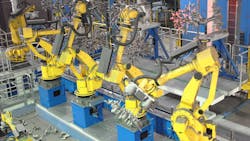Georg Fischer AG’s GF Automotive announced the start-up of a new production line at its ductile iron foundry in Mettmann, Germany, centering on a robotic pouring operation. The estimated $46.5-million modernization took 13 months to complete.
The contractor and equipment suppliers for the improvement project were not reported. Earlier this year, ABP Induction noted it had installed a new, 90-metric ton channel furnace and 1,200-MW power supply at Mettmann.
The Mettmann foundry was established over 100 years ago, and produces up to 200,000 metric tons/year of ductile iron automotive and commercial vehicle parts, including longitudinal bearings, steering knuckles, suspension arms, camshafts, rear-axle casings, and wheel hubs. GF Automotive noted that Mettmann’s castings are incorporated into the new Audi A3 and the VW Golf.
The new Aeration Molding Robotpouring (AMR) production line addresses automotive customers’ demand for lighter parts, according to GF Automotive. It has a capacity of up to 60,000 metric tons/year of ductile iron parts, including parts that the operator describes as “exceptionally fine-featured, and thus lightweight.”
The AMR line has 20 robots pouring ductile iron, reducing the labor requirements, and also sets “a benchmark in terms of energy efficiency,” the foundry operator stated. A built-in heat-recovery system converts waste heat to warm the plant, and state-of-the-art electro motors are used to cut energy consumption by over 40%.
"The new, highly automated and very much eco-friendly manufacturing line yet again substantially boosts product quality and replaces two older facilities, thus decisively enhancing our competitiveness," stated Yves Serra, CEO of Georg Fischer AG.
About the Author
Robert Brooks
Content Director
Robert Brooks has been a business-to-business reporter, writer, editor, and columnist for more than 20 years, specializing in the primary metal and basic manufacturing industries. His work has covered a wide range of topics, including process technology, resource development, material selection, product design, workforce development, and industrial market strategies, among others.
